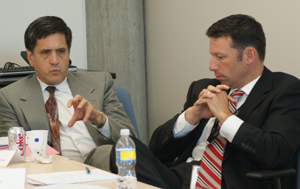 |
Keith Mueller, Ph.D., makes a point during a health care reform discussion for media at the medical center last week as UNMC Physicians CEO Cory Shaw looks on. (Photo by Andrew E. Nelson, UNMC public relations) |
That’s where UNMC comes in. With a bevy of experts in all aspects of health reform, UNMC wants to be seen by Nebraskans as a resource for the state and the community.
Last week, UNMC took its first steps to provide information in the health reform arena when it briefed members of the news media and launched a new Web site on the subject.
“As the state’s only public academic medical center, we feel an obligation to take the lead when an issue like this arises,” said Bob Bartee, vice chancellor for external affairs. “Health care reform is going to have a huge impact on our society. We want to make sure that the medical center is helpful in explaining that impact.”
|
Leading up to last week’s media briefing, three white papers were developed by the committee and placed on the Web site. In addition, the Web site provides the latest information on the three health care plans that have emerged from congressional committees.
The white papers deal with universal coverage, workforce issues and payment/reimbursement. It’s likely that more white papers will be developed by the group in the months ahead, said John Benson, M.D., professor of internal medicine and the moderator for the media briefing.
The three white paper topics were the basis of the discussion at the media briefing, and a fourth topic — the impact of health reform on employers — was added to the slate.
Besides Dr. Benson, other presenters at the media briefing included:
- Mark Bowen, director of government relations for UNMC;
- Glenn Fosdick, president and CEO, The Nebraska Medical Center;
- Keith Mueller, Ph.D., interim dean, UNMC College of Public Health;
- Cory Shaw, CEO, UNMC Physicians; and
- Tom Tape, M.D., section chief, UNMC Department of Internal Medicine.
Six members of the news media attended the briefing. They included two health reporters and an editorial writer for the Omaha World-Herald, a reporter for the Lincoln Journal Star, and news directors for KETV (Ch. 7) and KPTM (Ch. 42).
The 90-minute briefing was filled with lively discussion and lots of questions from the media.
A sampling of some of the commentary can be read on the right.
The briefing was well received by the media. Indicative of this was an e-mail comment afterwards by Joe Radske, news director for KPTM.
“Thank you so much for holding the event on health care reform,” Radske said. “It was excellent. I’ve already prepared a document for all my staff to read so they are better informed. There were multiple stories generated by the discussion.”
The Health Reform Committee is tentatively planning two more events in August – a forum for employees and a conference open to the public. UNMC Today will provide all the details as these events are finalized.
Members of the medical center health care review group are:
- John Gollan, M.D., Ph.D., dean of the College of Medicine
- Bob Bartee, vice chancellor of external affairs
- Pam Bataillion, associate professor and assistant dean for administration, College of Nursing;
- Bob Bell, vice president for business and community development, UNeMed
- Gerald Moore, M.D., professor of rheumatology, and senior associate dean for academic affairs
- James Gigantelli, M.D., professor of ophthalmology and visual sciences, assistant dean of government relations
- John Benson, M.D., professor of internal medicine
- Kim McFarland, D.D.S., assistant professor, oral biology, College of Dentistry;
- Keith Mueller, Ph.D., interim dean of the College of Public Health and health policy expert
- Michael Sitorius, M.D., chairman of the Department of Family Medicine
- Robert Wigton, M.D., associate dean for graduate medical education
- Thomas Tape, M.D., section chief, Department of Internal Medicine
- Mark Bowen, director of government relations
- Barbara Schaefer, senior vice president, human resources, Union Pacific Railroad
- Cory Shaw, CEO, UNMC Physicians
- Bill Dinsmoor, chief financial officer at The Nebraska Medical Center
- Harris Frankel, M.D., a private practice neurologist; and
- Tom O’Connor, senior associate director, UNMC public relations.